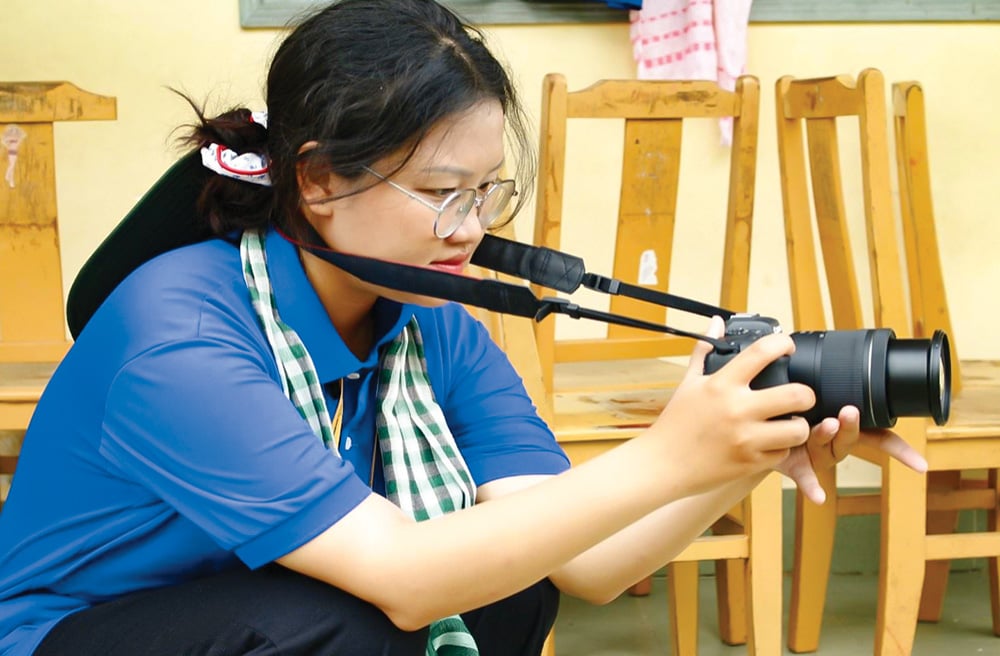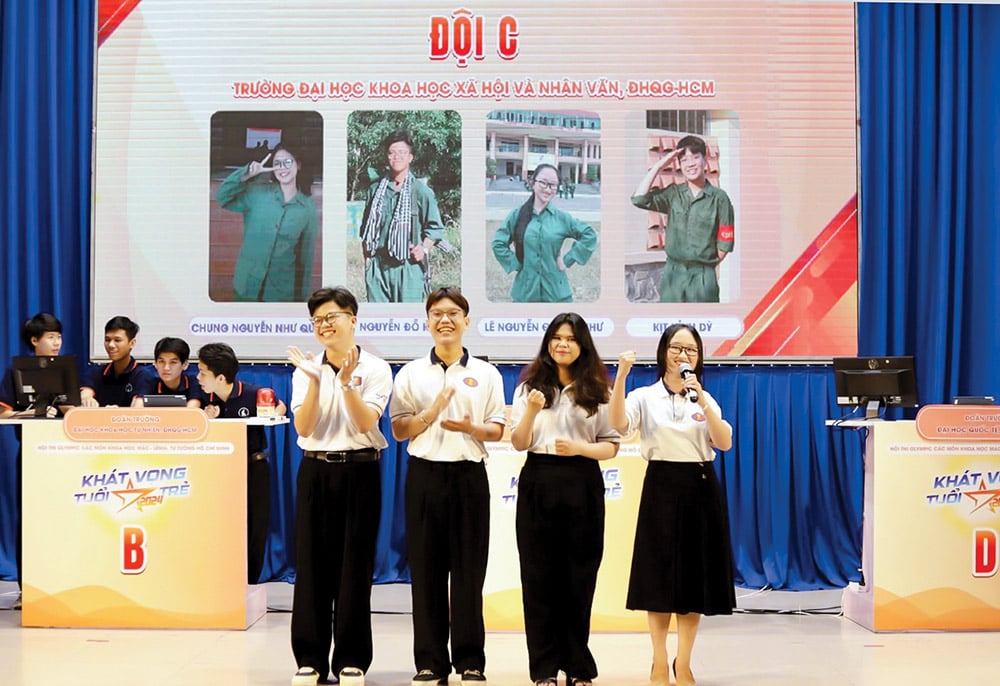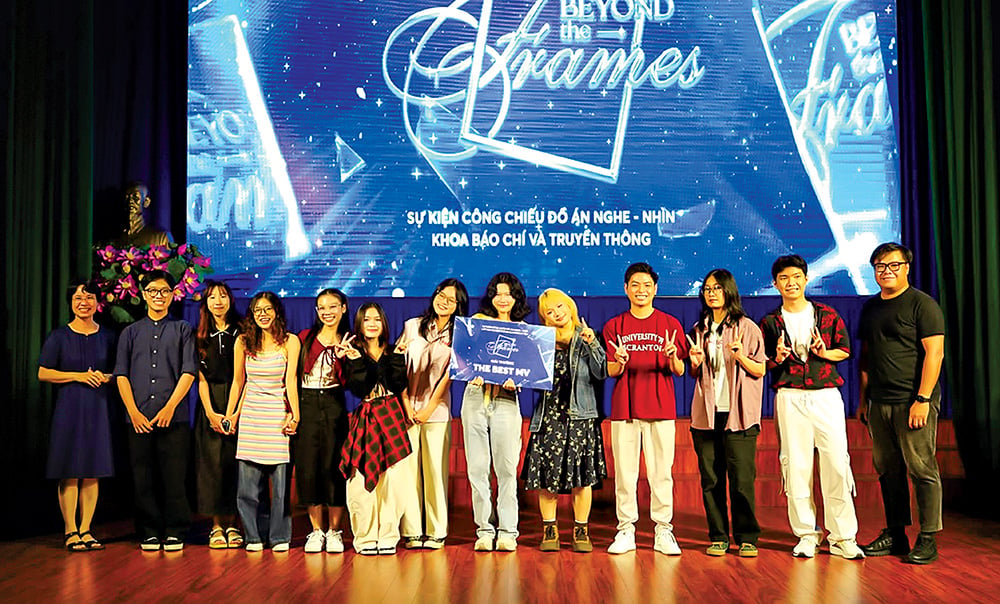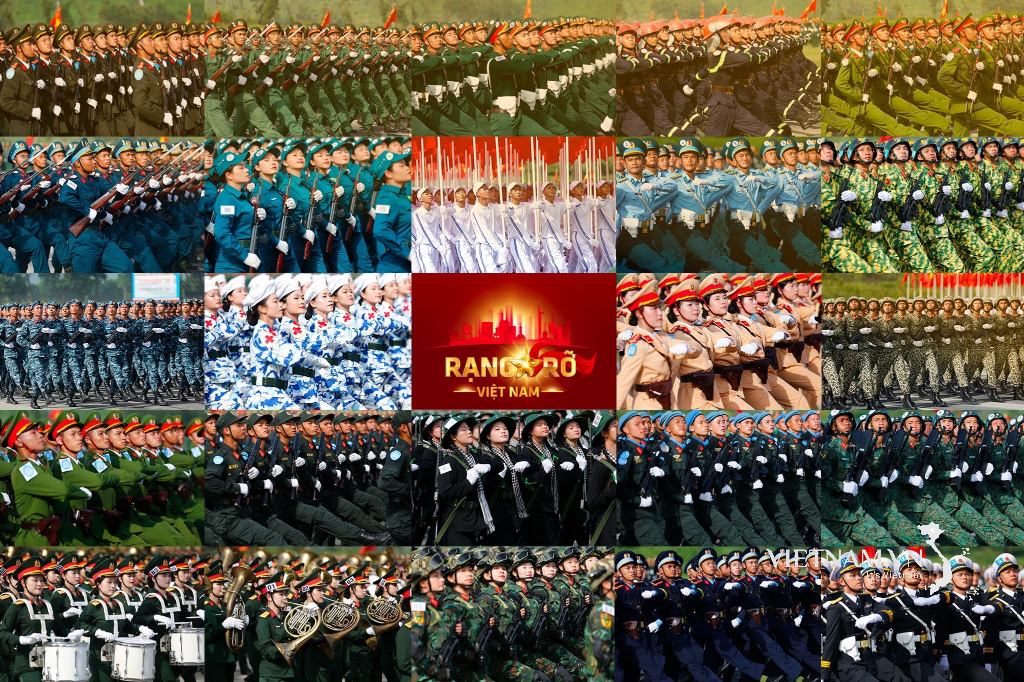- Continuing the tradition
- Silently contributing to the passion for the profession.
Previous generations of journalism students often studied in limited conditions, with scarce professional materials, and relied heavily on traditional books, print newspapers, and archival materials for access to information. They honed their professional skills through fieldwork, internships at newsrooms, and apprenticeships with experienced journalists. Their self-learning spirit, diligence, and passion for exploring practical applications were key characteristics. In contrast, today's journalism students grow up in a digital environment with virtually unlimited access to knowledge. With just a smart device connected to the internet, they can access thousands of international articles, professional books, instructional videos, and statistical data. Learning methods are also more diverse: learning through videos, practicing with video editing software, working on digital platforms, and interacting directly with instructors online. Proactiveness and creativity in learning are emphasized more than ever before.
Above all, the differences in professional skills and tools between journalism students today and those of the past are also very clear. Journalism students in the past were largely trained according to the traditional journalism model: writing for print newspapers, television reports, and radio broadcasts. This meant they focused on writing skills, the ability to express themselves clearly, observing reality, and having a meticulous and rigorous work style. The tools at that time were quite rudimentary: handheld tape recorders, mechanical cameras, notebooks, ballpoint pens... Therefore, they learned more about social communication skills and life experience than about advanced modern technologies.
Modern journalism students are trained in multimedia, requiring them to know how to film, edit videos , edit images, produce podcasts, create content for social media, and master specialized software such as Premiere, Photoshop, Canva, CapCut, and AI for news writing. In addition, their work tools are optimized; a smartphone alone can be used to complete an entire electronic news report or livestream an event. The concept of a "multitalented reporter" has become an inevitable trend and is fully embodied in journalism students.

Journalism students must also hone their practical skills and learn to respond to real-life reporting situations.
Of course, due to the ever-increasing demands of the times, current journalism students also have different perceptions of the profession and job opportunities. Previous generations of journalism students often chose journalism out of passion, a desire to contribute, and a spirit of service to society. In the context of a challenging economy , journalism wasn't a "money-making" profession, but it was still considered a noble profession with significant social influence. Job opportunities were primarily concentrated in state-owned media organizations.
Nowadays, journalism students approach the profession with a more realistic perspective, considering income, personal development opportunities, and flexibility in the work environment. Besides traditional newsrooms, they can work at media companies, advertising agencies, YouTube channels, digital newsrooms, content production businesses, etc. Many students even choose independent journalism, becoming content creators on digital platforms like TikTok, Instagram, or personal podcasts.
The differences between journalism students of the past and present are an inevitable result of technological development, social change, and globalization. While journalism students of the past left their mark with a spirit of discipline, responsibility, and professional ideals, today's journalism students demonstrate dynamism, creativity, and quick adaptation to new environments. However, regardless of the era, journalists must always uphold the core principles of the profession: honesty, objectivity, and accountability to the public.

Some journalism students participate in competitions with other schools to improve their knowledge and situational problem-solving skills. (Photo provided by the Journalism Department, University of Social Sciences and Humanities)
In the context of the Fourth Industrial Revolution (4.0) profoundly impacting all fields, the journalism industry is also not outside the cycle of digital transformation and technology application. Journalism students - who will become the masters of the future media - are facing many opportunities, along with countless challenges. To avoid falling behind, they need to equip themselves with flexible thinking, multimedia skills, and a strong professional ethics.
Nguyen Ngoc Nhu Y, a first-year journalism student at the University of Social Sciences and Humanities (Vietnam National University Ho Chi Minh City), shared: “The 4.0 era has brought a more dynamic and open environment for journalism than ever before. With the development of the Internet, social media, artificial intelligence, virtual reality, and big data, we are no longer limited by space and time. Students must have sufficient skills to produce content independently, publish podcasts, write personal blogs, or create news reports using smartphones without having to wait until graduation. In addition, we must continuously improve our skills to proficiently use new technologies, such as AI to support quick news writing, audio editing, and automatic video editing... saving time and increasing work efficiency. Furthermore, accessing abundant information from around the world has become easier, helping students enhance critical thinking and problem-solving skills.”
However, the spread of misinformation and fake news on social media is also a serious problem today. This requires journalism students not only to have information verification skills but also to uphold professional ethics and remain faithful to the truth – something that is gradually being neglected amidst the wave of "clickbait" and "attracting interaction."
The 4.0 era opens doors full of opportunities for journalism students, but it also brings many challenges. According to Mr. Le Anh Tu, CEO of iGem Agency and lecturer at the Faculty of Public Relations and Communication, University of Economics and Finance Ho Chi Minh City (UEF), “Becoming a multi-media reporter who takes on too many responsibilities as is common today leads to students not specializing in anything. This results in their thinking not developing all skills simultaneously. It's important to recognize that no one can be good at everything at once. Today's students must have specific strengths. The core skill of the profession is writing, which must be mastered, but other skills should also be around 7-8 out of 10. Supplementary skills honed over time will help them stand firmer in the profession. In addition, they need a passion for the profession and perseverance to have a chance to shine.”

Students from the Journalism Department of the University of Social Sciences and Humanities are making documentaries and even have an awards ceremony to encourage their professional skills.
More than just news reporters, today's journalism students are also creators, shaping public opinion and contributing to building a smart society. With a spirit of continuous learning, passion for their profession, and discernment in an era of "information overload," journalism students can absolutely become a pioneering force, contributing to shaping a new face for modern journalism.
Associate Professor Dang Thi Thu Huong, Vice Rector of the University of Social Sciences and Humanities (Vietnam National University, Hanoi), shared: "Unlike undergraduate training in other social science fields, developing professional skills is always the number one priority in journalism and media training schools. In the context of journalism having to compete with social media and being caught up in the whirlwind of artificial intelligence, journalism training must even more firmly uphold its core values, which are training people on a solid foundation of knowledge, with intellectual depth, and delivering accurate and humane news. Therefore, the current training program is constantly changing and supplemented with many new modules to keep up with modernity, such as: mobile journalism, data journalism, content organization and creating masterpieces of journalism... The important and valuable knowledge base from teachers who are senior journalists will help students, future journalists, to thoroughly identify issues and convey information to the public." "The best literature"./.
Lam Khanh
Source: https://baocamau.vn/sinh-vien-bao-chi-thoi-nay-a39751.html





![[Photo] Standing Committee member of the Party Central Committee Tran Cam Tu presents the Decision appointing the Secretary of the Party Committee of the Ho Chi Minh National Academy of Politics.](/_next/image?url=https%3A%2F%2Fvphoto.vietnam.vn%2Fthumb%2F1200x675%2Fvietnam%2Fresource%2FIMAGE%2F2026%2F02%2F02%2F1770039902160_le-cong-bo-bt-hvctqg-11-7880-jpg.webp&w=3840&q=75)




































































































Comment (0)